I’m pretty sure there were only two times in my life when comicbooks almost lost me. The end of 1985/early 1986 was one of them.
At that point in time, I was pretty much done with Marvel Comics. Secret Wars had totally turned me off. Avengers was wallowing in what was, for me, the doldrums. John Byrne was limping to the finish line of his seminal time there. Bill Sienkiewicz had stopped drawing New Mutants. Walt Simonson was winding down his time drawing Thor. Not to mention, I had no idea that Frank Miller had returned to writing what was to quickly become a classic run on Daredevil -- a series I’d dropped years before -- or that something as deep as Moonshadow was happening at Epic Comics. Over at DC Comics, George Pérez had left New Teen Titans and I wasn’t so enthralled by Crisis on Infinite Earths at that point (I was buying it, but I wasn’t invested in it). I hadn’t yet discovered that Alan Moore even existed, let alone what he was doing on Swamp Thing (or Miracleman, which had only just begun to be reprinted by Eclipse Comics) and everything else that had caught my attention at DC in the early 1980’s -- Thriller and Ronin, primarily -- were long over. I was sporadically picking up Nexus, but I wasn’t a licensed driver yet, and accounting for the fact that I wasn’t too keen on spending any more time with my middle-aged parents than was absolutely necessary, my trips to the Great Escape (the Direct Market store where I bought my comicbooks) were becoming fewer and farther between. So I just wasn’t keeping up with everything that was out there. I was still buying comicbooks, but I really think that I was starting to check out. The passion that was there when I was ten, eleven, twelve years old was no longer there. I was fifteen and I was starting to have girlfriends. I was in my first real high school rock band. Looking back, all of this begs the question: was life simply unfolding exactly as it was supposed to? Was I finally aging out of superhero comicbooks?
Maybe I was. We’ll never know. Because a single weekend in April of 1986 brought it all roaring back.
What was becoming, as I said, an ever rarer trip to the Great Escape (facilitated by my long-suffering mother, no doubt) had yielded an absolutely monumental result: Dark Knight Returns Book Two and the fanzine, David Anthony Kraft’s Comics Interview issue #31, featuring an extensive, Dark Knight-centric chat with Frank Miller (technically, I’m convinced what I bought that day was actually a “Special Edition” reprint of issue #31, originally released two months earlier… that’s how hot Frank Miller and Dark Knight really were at the time. Even fanzines that featured them were selling out and going back to press).
Yes, it’s true… Book Two was the first issue of Dark Knight Returns that I bought and read. I told you, I was a little checked out. So much so that I had no awareness that the Dark Knight project was even a thing! So I’d missed Book One completely.
Now, try and imagine the type of impact this one-two punch had on me. I don’t know if I’d had the conscious thought that I was losing interest in the medium, that at fifteen, I might’ve seen it all. Probably not. But Dark Knight Returns was this… atomic thunderbolt that hit hard on almost every level (certain levels that would take me years to put into proper perspective). And since timing is everything, I still hold up Book Two as the best issue of the four. From the iconic cover -- a visualization of Batman that just blew my f**king mind -- to the writing and the highly disciplined storytelling to the depictions of old faves and the introductions of new characters. It was all right there.
Then there was the issue of Comics Interview, which was the first time I’d read an in-depth interview with a creator simultaneously alongside the specific work they were discussing. And Frank Miller wasn’t even finished with Dark Knight Returns when he sat down with Comics Interview; he claimed he was just completing Book Three! So it was truly a look into Miller’s mind while he was still locked into that project’s creative flow. And as a punk kid who had once harbored aspirations of making comicbooks for a living, it absolutely had a profound effect on me.
Miller’s views on Batman and Superman and superheroes in general were completely eye-opening. The way that he placed Batman firmly in the current decade -- despite the story supposedly taking place in an undetermined future -- was revelatory. Miller evoked Bernard Goetz, Rambo and Hill Street Blues (which he hilariously referred to as “lazy and slow”) within the context of Batman’s simplicity of mission and purity of concept. Here’s a few choice Miller quotes from the interview…
“Batman only really works as a character if the world is essentially a malevolent, frightening place. The same is true of Dirty Harry.”
“I can’t stand heroes who snivel and whine.”
“I was very worried because as I worked on it I became aware that the only way I could do this character was to be absolutely true to him. It meant giving him a much harder edge than he’s ever had. For the idea to work logically for me, his methods couldn’t be nice. He is essentially a terrorist superhero.”
No professional comicbook creator had ever referred to Batman -- or any iconic superhero -- as a “terrorist” before. Again, Miller was pushing the envelope at the exact moment in time when I -- as a fifteen-year-old reader -- needed to have that envelope pushed. And then for him to turn around and depict Superman as a not-so-conflicted government shill, someone who took orders from a very Reagan-esque U.S. President… all leading to a climactic battle between the two heroes in Book Four…. that blew me away, too. Of course, I still like Book Two better, but it was a specific take on Superman that had never been seen before… and never would again.
(later that summer, John Byrne would take his own big swing redefining Superman for the 1980’s with the Man of Steel mini-series, but if Miller had released Book Four of his series on time -- which was released months late -- he would’ve gotten there first. And he should’ve gotten there first.)
Needless to say, I was back, baby. I was in it to win it. The future had arrived. I quickly caught up on what I’d missed (as best I could) from the previous months. Not only on Dark Knight Returns’ second printing of Book One, but also on the Miller/Mazzucchelli Daredevil, Matt Wagner’s Mage, Alan Moore’s Swamp Thing and Miracleman (and the rest of Alan Moore’s work), Howard Chaykin’s Shadow and American Flagg!, William Messner-Loebs’ Journey and all of the long-running fanzines like Amazing Heroes, The Comics Journal, the Comic Buyer’s Guide and, of course, Comics Interview. And the best was yet to come. By that summer, I was back to making my own comicbooks and, thanks to a newly-minted driver’s license, I was hitting the Great Escape week in, week out.
Because as it turned out, 1986 became a very important year for comicbooks. And I was f**king there for it. I was at the right place at the right time and, once again, the course of my life changed. And it would never be the same again.
Joe Casey
USA





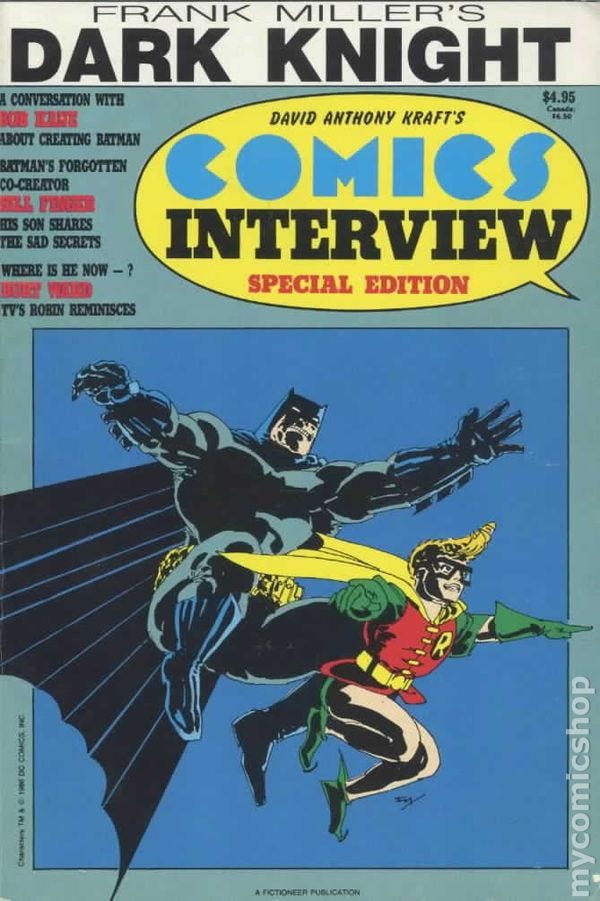
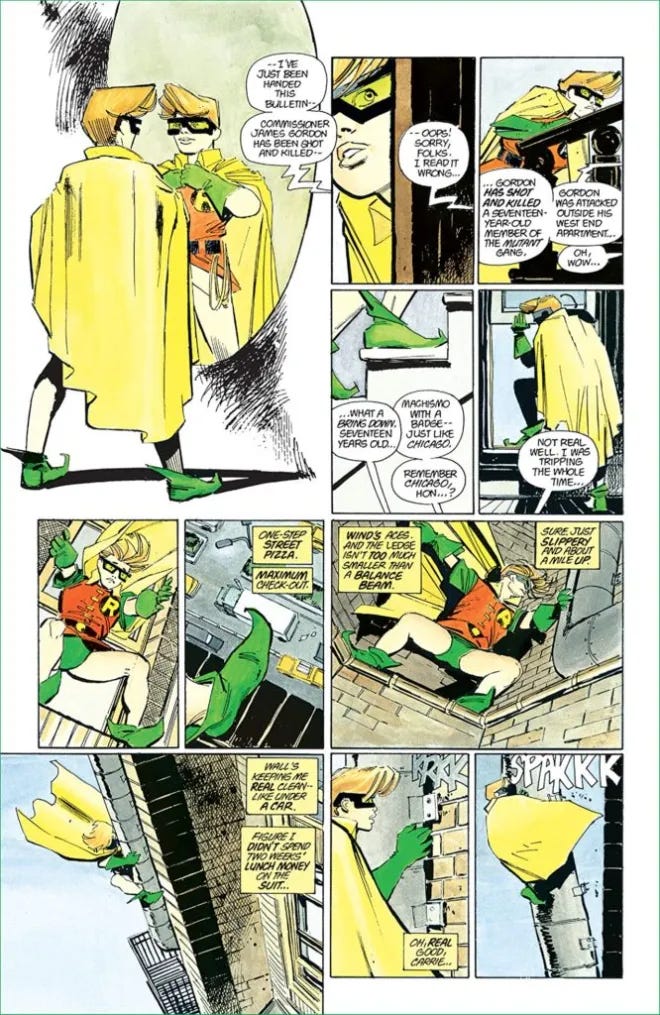
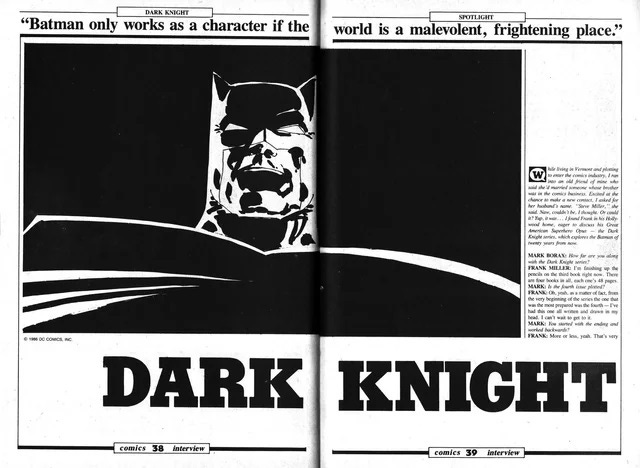
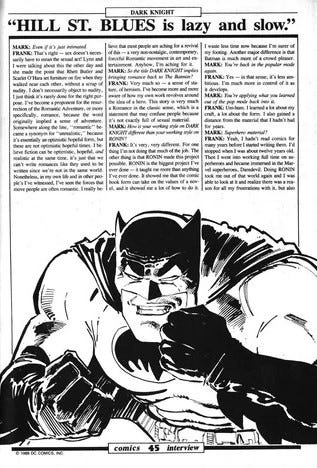
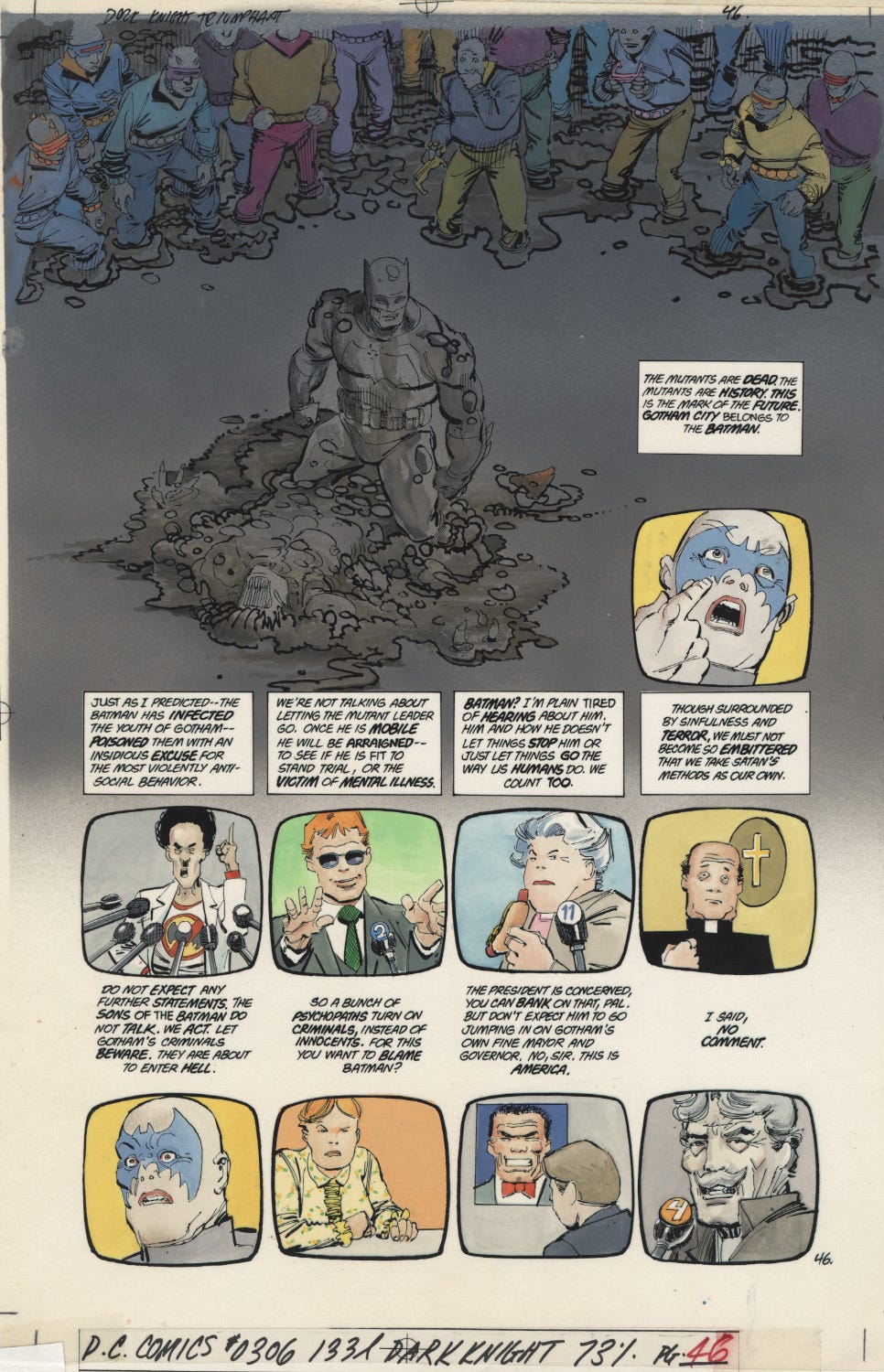
Reading about your apathy toward comics in the mid-’80s reminds me of how many of us ’90s comics kids felt by the end of that decade. You and Grant jumping onto the X-Men books in 2000 was my 1986/Dark Knight Returns moment.
That Book 2 cover is so great! 🔥 I didn’t discover The Dark Knight Returns until the 2nd printing of the combined TPB… but it just blew my mind at the time (and the story still holds up after all these years! 😎) Thanks for the trip down memory lane. 🍻